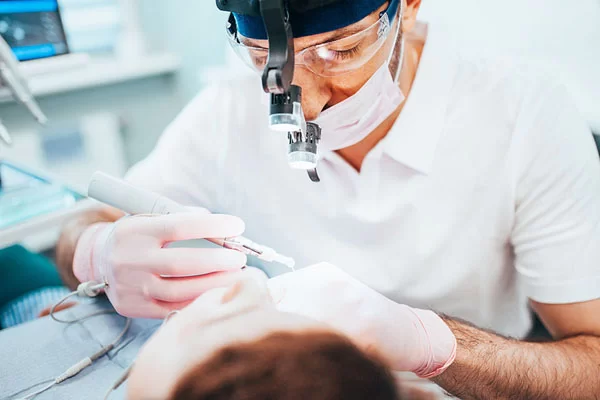Please note we may not offer these treatments at our office. Contact (940) 566-4888 to learn more.
An Innovative Solution to Infected Root Canals
Regenerative endodontics is a cutting-edge approach to treating damaged or infected teeth and an alternative treatment for root canal therapy. This innovative procedure uses the body’s natural healing mechanisms to regenerate new tissue and restore the function of the affected tooth in the root canal system.
While traditional endodontic treatments focus on removing damaged tissue, regenerative endodontics aims to restore the tooth to its natural state. Learn more about this treatment with our experienced Denton, TX, dentists’s guide or by calling (940) 566-4888.
What Is Regenerative Endodontics?
Regenerative endodontics (RET) is a state-of-the-art technique that involves removing damaged or infected pulp tissue and introducing bioactive materials into the root canal. These materials often contain growth factors and stem cells designed to stimulate the growth of new pulp and dentin, vital components of the tooth structure. The goal is to achieve root maturation and apical closure, enhancing the tooth’s strength and resilience, particularly beneficial for young patients with developing teeth.
Traditional endodontic treatments such as root canal therapy (RCT) may result in thin and fragile roots, which can increase the risk of tooth fracture over time. RET, on the other hand, aims to stimulate root development, leading to stronger and more resilient teeth.
Why Consider Regenerative Endodontics?
Regenerative endodontic therapy offers several benefits over traditional endodontic treatments, including:
- Enhanced Success Rates: Clinical studies reveal that regenerative endodontic procedures have higher success rates compared to traditional root canal treatments, particularly for immature teeth with open apices (the tip of the root).
- Reduced Risk of Future Infections: This procedure promotes a biologically active root canal environment that is better equipped to resist infections and sustain long-term dental health.
- Minimizes the Need for Implants: By preserving the natural tooth structure, regenerative endodontics can potentially reduce the need for dental implants and other more invasive restorative options.
- Long-Term Cost Efficiency: Though initial costs may be higher, regenerative endodontics can be more cost-effective over time by reducing the need for additional treatments or restorations.
- Natural and Biocompatible: Utilizing natural and biocompatible materials, regenerative endodontics minimizes the risk of adverse reactions and complications.
Am I a Candidate for Regenerative Endodontics?
Regenerative endodontics is not suitable for everyone. The following factors are considered when determining if a patient is a good candidate for regenerative endodontics:
- Age: Most effective for patients under 18 with teeth still in development.
- Tooth Maturity: Best suited for teeth with immature roots and open apices.
- Pulp Vitality: More successful in teeth with vital pulp tissues, supporting tissue regeneration.
- Infection Status: Active infections may hinder the dental pulp regeneration process.
- Tooth Structure: Effective in teeth with an intact coronal structure, which protects the new tissue.
- Overall Health: Patients with compromised immune systems or certain medical conditions might not be suitable candidates.
The Regenerative Endodontics Process
Examination and Diagnosis
A dental professional will examine the infected tooth to determine the extent of the damage and whether regenerative endodontic treatment is an appropriate option.
Access and Cleaning
Your Denton dentists will make an opening in the tooth to access the pulp chamber and root canal space. They’ll remove damaged or infected pulp tissue and thoroughly clean the root canal space.
Placement of Regenerative Material
They’ll introduce a regenerative material into the root canal space, which may include blood products, stem cells, growth factors, or other materials that stimulate new tissue growth.
Temporary Filling
Your dentist will place a temporary filling in the tooth to protect it while the new tissue develops.
Follow-up Appointments
You’ll need to return for several follow-up appointments to monitor the progress of the treatment and assess whether the new tissue is developing as it should.
Frequently Asked Questions
While regenerative endodontics shows promise for treating immature permanent teeth with infected pulp, there are several limitations associated with this approach. Here are some common limitations:
- Patient age
- Pulp tissue condition
- Root canal anatomy
- Limited long-term data
- Time-consuming process
- Treatment complexity and expertise
- Limited application
Regenerative endodontic treatment typically requires multiple appointments over several months to complete. The exact length of treatment will depend on factors such as the severity of the damage, the patient’s age, and the healing rate of the tooth.
Insurance coverage for regenerative endodontic treatment can vary depending on the patient’s policy and the treatment performed. Patients should check with their insurance provider to determine whether regenerative endodontic treatment is covered and to what extent. In some cases, insurance may only cover the cost of traditional root canal therapy, not regenerative endodontics.
Discover This New and Modern Dentistry Technique
Regenerative endodontics is a promising new approach to treating damaged or infected teeth. By using the body’s natural healing mechanisms, regenerative endodontics can promote the growth of new tissue and restore the function of the affected tooth. As research continues, regenerative endodontics will likely become an increasingly popular option for dental patients seeking to preserve their natural teeth.
Call our Denton practice at (940) 566-4888 today to schedule an appointment and learn more about our root canal treatment. We proudly serve patients in Denton and surrounding areas, including Robson Ranch, Corinth, Argyle, and Krum, TX.




